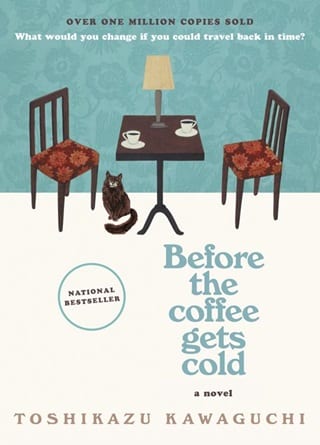clang-dong
“Hello, welcome,” Nagare shouted. Kazu collected her thoughts and served the coffee.
I feel like there is something important that I’m missing.
To dispel the feeling, she gave her head a little shake .
“Hello.” Kohtake had entered the café. She was on her way home from work.
She was wearing a lime-green polo shirt and a white skirt with black pumps on her feet. She had a canvas bag hanging from her shoulder.
“Hello, Kohtake,” Nagare said.
On hearing her name called, she spun around on her heel as if to walk out again.
“Ah, sorry. Mrs. Fusagi,” he corrected himself. Kohtake smiled with approval and sat at the counter.
It was now three days since Kohtake had returned to the past and received the letter that Fusagi had written but never given to her. She now insisted upon “Mrs. Fusagi.”
She hung her bag on the back of her chair. “Coffee, please,” she ordered.
“Certainly,” Nagare said, bowing his head and turning to the kitchen to brew the coffee.
She looked around the empty café, flexed her shoulders, and took a deep breath. She had planned to accompany Fusagi on his walk home if he had been at the café, so she was a little disappointed. Kazu, who had been watching the exchange between Nagare and Kohtake with a smile, had finished serving the woman in the dress.
“I’m just taking my break,” she said and disappeared into the back room. Kohtake said, “Okay,” and gave her a little wave. It was early August and summer was really peaking.
Kohtake, though, liked her coffee hot, even in summer. She liked the aroma of it when it was freshly brewed. She couldn’t enjoy iced coffee in the same way. Coffee was far more pleasurable when it was hot .
When Nagare made coffee, he usually brewed it using the siphon method, by pouring boiling water into a flask, then heating it to allow the evaporated steam to rise through a funnel and extract the coffee from the ground beans held inside the funnel. However, when he made coffee for Kohtake and some other regular customers, he brewed the coffee hand-drip style. When making hand-drip coffee, he put a paper filter in a dripper, added the ground beans, and poured boiling water over them. He thought the hand-drip style of making coffee allowed for greater flexibility as you could change the bitterness and sourness of the coffee by changing the temperature of the water, and the way you poured it. As the café did not play background music, it was possible to hear the soft sound of the coffee dripping, drop by drop, into the server. When Kohtake heard this dripping sound, she would smile in satisfaction.
Kei tended to use an automatic coffeemaker. This machine was equipped with a single button that allowed different tastes to be accommodated. As Kei was not a master in the art of making coffee, she preferred to rely on a machine. Some of the regular customers who came to enjoy a cup of coffee did not therefore order when Nagare was not around. After all, the coffee was always the same price, whether it was brewed by Nagare or Kei. Kazu normally made coffee using the siphon method. The reason for this choice was not because of taste. She simply enjoyed watching the hot water rise up through the funnel. Besides, Kazu found the hand-drip coffee too tedious to make.
Kohtake was served with a coffee specially brewed by Nagare. With the coffee in front of her, she closed her eyes, and inhaled deeply. It was her moment of happiness. As per his insistence, the coffee had been made from mocha beans with their distinct aroma, which coffee drinkers either love or hate. Those who enjoy the aroma, like Kohtake, can’t get enough of it. In fact, you could say that the coffee picked the customers. Just as with his butter, Nagare enjoyed watching customers take pleasure in the aroma. As he watched, his eyes narrowed even further.
“By the way,” said Kohtake while enjoying her coffee, as if she’d suddenly remembered, “I noticed that Hirai’s bar has been closed both yesterday and today. Do you know anything about that?”
The snack bar, a sort of mini–hostess bar, that Hirai ran was just meters from the café.
It was just a small bar comprising a counter with six seats, but it was always busy. It opened at different times each evening, depending on Hirai’s mood, but it was open seven nights a week, all year round. Since she opened its doors, the bar had opened every night without fail. Patrons often waited outside for it to open. Some nights, as many as ten customers squeezed into the place. Only the first six customers sat on chairs; the rest would drink standing up.
The patrons weren’t only men, either. Hirai was popular among women too. Her blunt way of speaking sometimes dented the pride of patrons, but they knew there was no malice intended, and there were never hard feelings. Patrons always felt comfortable around her; she had a natural gift for being able to say anything and get away with it. She dressed in a flashy way and couldn’t care less what anyone thought about it. But she believed in good manners and etiquette. She would listen to anything anyone had to say. Though if she thought a patron was wrong, even if they were of high social status, she would have no qualms about setting them straight. Some patrons were generous with their money, but she never accepted any money except in payment for drinks. Some patrons would try to earn her favor by offering her expensive gifts, but she never accepted them, not once. There were even men who would offer her a house or an apartment, a Mercedes or a Ferrari, or diamonds or the like, but she would just say, “I’m not interested.” Even Kohtake sometimes visited her bar. It was a place where you could be guaranteed to have a fun time drinking.
Kohtake had noticed that Hirai’s bar, usually so full of customers, had been closed for two nights in a row, and none of the patrons knew why. She was a little concerned.
As soon as she broached the subject of Hirai, Nagare’s face turned serious.
“What happened?” she asked, a little startled.
“Her sister. There was a road accident,” he said softly.
“Oh no!”
“So she went home.”
“Oh how terrible!” She sank her gaze into the pitch-black coffee. She knew Hirai’s younger sister Kumi from when she would visit and try to get Hirai—who had broken ties with the family—to come home. For the last one or two years, Hirai had found her frequent visits such a nuisance that more often than not she avoided meeting her. Regardless, Kumi would make the visit to Tokyo almost every month. Three days ago, Kumi had visited the café to meet Hirai. The accident occurred on her way home.
The small car that she was driving collided head-on with an oncoming truck whose driver must have dozed off. She was taken to hospital in an ambulance but did not survive the journey.
“What horrible news.” Kohtake left her coffee alone.
The faint steam that had been rising from it had disappeared. Nagare stood with arms folded, silently looking at his feet.
He had received an email on his phone from Hirai. She probably would have contacted Kei, but Kei didn’t own a phone. In the email, Hirai gave some details about the accident and mentioned that the bar would be closed for a while. The email had been written in a matter-of-fact tone, as if it had happened to someone else. Kei had used Nagare’s phone to reply and had asked how Hirai was doing, but she got no response. The inn on the outskirts of Sendai was called Takakura, meaning “The Treasury.”
Sendai is a popular tourist destination, particularly famous for its gorgeous Tanabata Festival. The festival is best known for its sasakazari : a towering piece of bamboo about ten yards long, to which five giant paper balls with colorful paper streamers are attached. Other decorations from the festival—colorful paper strips, paper kimonos, and origami paper cranes—are sought after by tourists who use them for business blessings and lucky charms. The festival always takes place from August 6th to 8th, which meant that in a few days, the decoration preparation in the downtown area around Sendai Station was due to begin. Given the two million tourists who were attracted to the three-day festival, Tanabata was the busiest period for Takakura, located as it was about ten minutes by taxi from Sendai Station.
 Fullepub
Fullepub 



